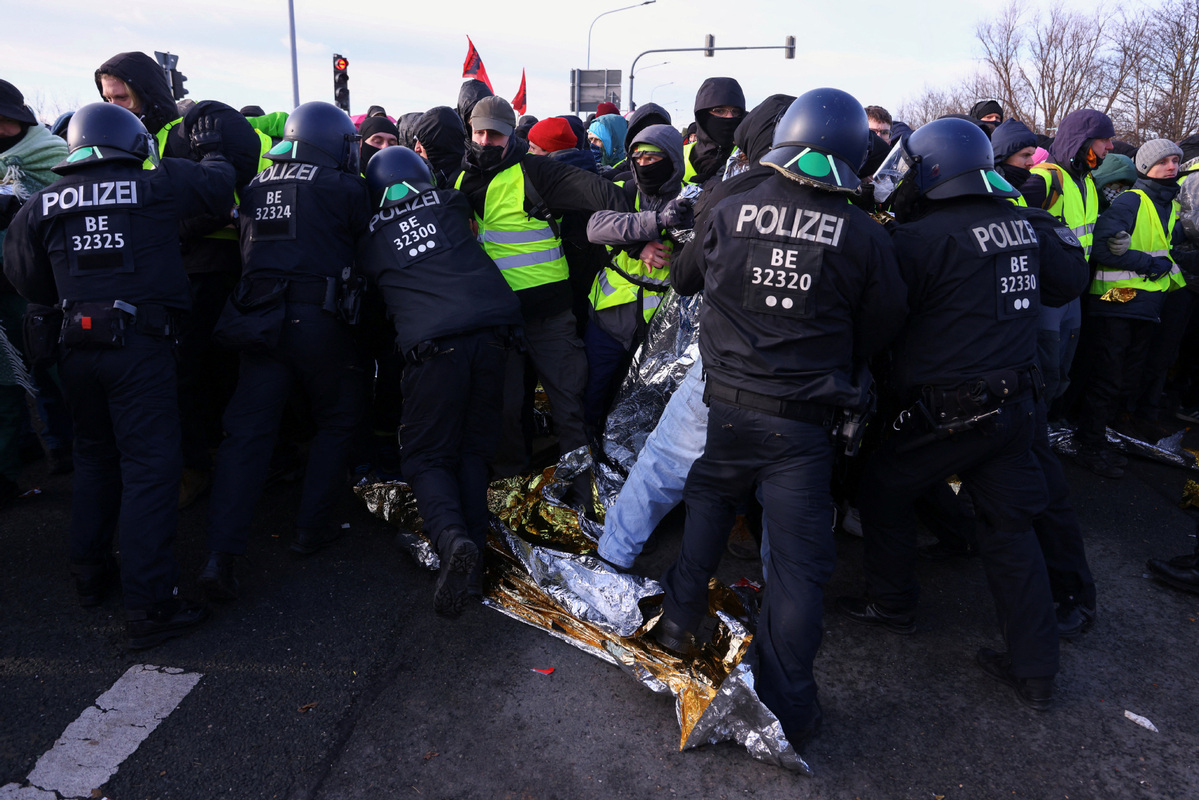
Police officers stand in front of protesters, as the protesters block a road during a demonstration, near the venue for the far-right Alternative for Germany (AfD) party congress in Riesa, Germany, Jan 11, 2025. [Photo/Agencies]
The battle lines in Germany's political landscape were clearly drawn this weekend in the small eastern town of Riesa.
As the far-right Alternative for Germany, or AfD, party gathered to nominate its candidate for chancellor in the Feb 23 snap election, thousands of protesters mobilized to oppose what they see as a growing fascist threat, leading to a confrontation that captured the essence of Germany's current political moment.
Polling at around 20 percent and currently placed second among German parties, the AfD has achieved what was once unthinkable in post-World War II Germany.
The surge in AfD's popularity has triggered an equally powerful countermovement, evident in the estimated 12,000 protesters who descended on Riesa from across the country, reported news wire services.
Protesters shouted anti-fascist slogans including "No to Nazis" outside the venue of the AfD convention where co-leader Alice Weidel was chosen as the party's candidate for chancellor in next month's election.
The protests in the state of Saxony, a longtime AfD stronghold, proved more disruptive than anticipated. Demonstrators successfully blockaded key access routes to the convention center, forcing police to mobilize in large numbers and use pepper spray, and causing a two-hour delay to the start of the two-day party gathering.
When Weidel finally arrived at the venue, having been caught in the blockades herself, she struck a defiant tone, rallying the 600 delegates with praise for defying what she termed "the left-wing mob", while AfD co-leader Tino Chrupalla characterized the demonstrators as "anti-democrats and terrorists".
Maria Schmidt, a spokesperson for the protest organizers, said: "Today, we are protecting the right of people to live in safety without the fear of deportation or being attacked. We are all making it clear: Riesa is not a peaceful place for fascism."
Analysts said Weidel's live X chat last week with US technology billionaire and the world's richest man, Elon Musk, who has endorsed her party, did little to change her prospects of becoming the country's leader, because Germany's established parties all maintain a strict policy of non-cooperation with the AfD and say they will not partner it in a coalition government.
The election frontrunner remains the mainstream conservative alliance of the Christian Democratic Union and its Bavarian sister party, the Christian Social Union, which is polling at 30 percent with its candidate Friedrich Merz widely expected to become chancellor.
While the union led by Merz campaigns on economic revival and immigration control, Weidel dismissed it as a "party of fraudsters" and has urged voters to "choose the original" instead.
In her speech, Weidel called for closing Germany's borders against undocumented migration, mass deportations of asylum-seekers, and stated she had no issue with using the controversial term "remigration", meaning a wide-ranging campaign to expel foreigners from Germany. She also promised to restore the damaged Nord Stream gas pipeline and pledged to dismantle the country's wind turbines, which she derided as "windmills of shame", if the AfD gained power.
The AfD's draft manifesto further outlines radical changes to national policy, including Germany's withdrawal from the eurozone and a return to nuclear power.
At a news conference in Hamburg on Saturday, Merz focused on his party's promise of "fundamental change" following the collapse of Chancellor Olaf Scholz's unpopular and fractious coalition in November.
Merz pledged to form "a government that stops arguing; a government that draws up reliable laws that also endure in the longer term", arguing this would create stability for investors and lead to renewed economic growth.
Polling at just 15 percent and now in third place, Scholz's Social Democratic Party gathered in Berlin where he acknowledged missteps but rallied supporters with a resolute "let's fight".